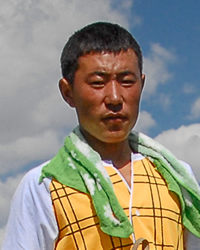Uuld in Mongolia

Photo Source:
Bernd Thaller - Flickr
Creative Commons
|
Send Joshua Project a map of this people group.
|
| People Name: | Uuld |
| Country: | Mongolia |
| 10/40 Window: | Yes |
| Population: | 16,000 |
| World Population: | 16,000 |
| Primary Language: | Mongolian, Halh |
| Primary Religion: | Buddhism |
| Christian Adherents: | 2.60 % |
| Evangelicals: | 2.50 % |
| Scripture: | Complete Bible |
| Ministry Resources: | Yes |
| Jesus Film: | Yes |
| Audio Recordings: | Yes |
| People Cluster: | Mongolian |
| Affinity Bloc: | East Asian Peoples |
| Progress Level: |
|
Introduction / History
The Uuld are a subgroup of the dominant Khalkha Mongols. The Khalkhas make up 70% of the people in Mongolia. 90% of the people of Mongolia understand the Khalkha-Halh Mongolian language.
The Mongolian empire of Genghis Khan and his grandson Kublai Khan began to decline in the late 14th century. The Mongolian people were divided into two main groups. The eastern group became part of China in 1691. Today this region is the Chinese province of Inner Mongolia. Beginning in the 1920s Outer Mongolia came under the control of the Soviet Union. The Soviet Mongolian leaders wanted the Khalkhas and the Uuld to settle down in villages and raise large numbers of animals for the good of the nation. These efforts were largely rejected. With the collapse of the Soviet Union in 1990, Mongolia became independent of foreign control.
The complete Bible and the JESUS Film are available in Halh Mongolian, the primary language of the Uuld.
Where Are they Located?
The Uuld live in central Mongolia. They mainly live in Hovd City and Hovd's Buyant and Erdeneburen districts.
What Are Their Lives Like?
Some Uuld still live the traditional, pastoral lifestyle. They raise horses, cattle, camels, goats, sheep and yaks. Their diet consists only entirely of animal products, meat and dairy. Their favorite drink is fermented mare's milk. Their circular tents are called yurts, which can be easily taken down and moved. The pastoral Uuld move four or five times a year seeking water and grass for their animals. Illiteracy is a major problem for the nomadic Uuld. Their lifestyle is not conducive to the education of their children. Children who do go to school often have to quit school early to help with their family business of caring for animals.
Other Khotogolds have moved to the cities for job and educational opportunities. They work in factories and as laborers. Educated Khotogolds own businesses and work in government positions.
Families arrange marriages. Sons inherit their father's tents and animals. The Uuld tend to marry within their group. Marriage to one spouse is the norm.
What Are Their Beliefs?
The Uuld are Tibetan Buddhists mixed with folk religion. Since the fall of the Soviet Union, there has been a revival of Buddhism in Mongolia. Buddhists have reopened temples. Shamans are again becoming popular. Shamans serve as medical workers and leaders who help people overcome the influence of evil spirits through rituals and offerings. There are currently no known Christian believers among the Uuld.
What Are Their Needs?
The Uuld need to hear the life-changing message of Jesus Christ who alone can free them from the fear of evil spirits and forgive their sins. Medical workers can bring the benefits of modern medicine to the Uuld. The Uuld need help in teaching their children how to read and write. The Uuld need to learn new job skills as their old nomadic life is disappearing.
Prayer Points
Pray the Lord sends believers to share the gospel with the Uuld.
Pray that the Uuld turn away from Buddhism and embrace the truths of the Bible.
Pray that strong movements to Jesus will bring whole Uuld families into rich experiences of God's blessings.